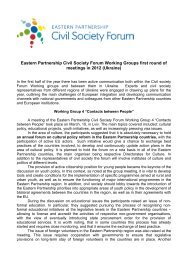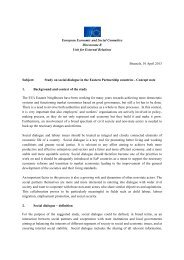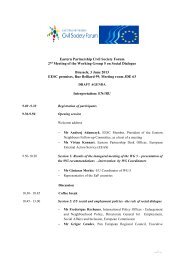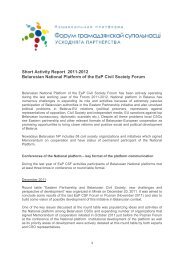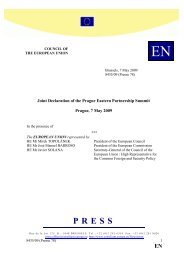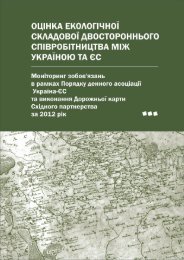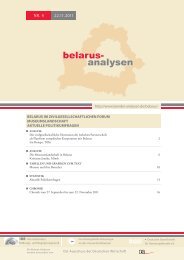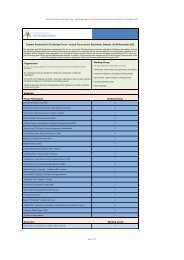Non-formal education - Eastern Partnership Civil Society Forum
Non-formal education - Eastern Partnership Civil Society Forum
Non-formal education - Eastern Partnership Civil Society Forum
Create successful ePaper yourself
Turn your PDF publications into a flip-book with our unique Google optimized e-Paper software.
vocational <strong>education</strong>, which provides for funding of vocational <strong>education</strong> institutions and carrying out<br />
various activities for the facilitation of the reform in the vocational <strong>education</strong> system. These priorities<br />
also include elaboration of vocational <strong>education</strong>al courses for non-Georgian population; teaching<br />
of Georgian language at the adult language centers; rising competence in Georgian language and<br />
state management for citizens with higher <strong>education</strong> resided in the mountainous and ethnic minority<br />
regions.<br />
State Strategy for Regional Development of Georgia<br />
Chapter 4 of the state Strategy for Regional Development of Georgia (approved by the Resolution<br />
N172 of the Government of Georgia, dated June 25, 2010 ) refers to stimulating the attraction of foreign<br />
direct investments in the country and states that the certain percentage of employed and other human<br />
resources shall include local population … establishment of the labor market should be supported; and<br />
for these purposes, it is vital “that the measures are defined for the vocational training and retraining of<br />
the local population” (Chapter 4, paragraph 4.6 ).<br />
The above conclusions are drawn up based on the Report drafted by the Working Group on Poverty<br />
Reduction and Employment (one of the 7 groups), established for the elaboration of the above-mentioned<br />
Strategy. In particular, paragraph 19 of the Report notes that ”the more educated the head of the family<br />
is, the lesser is the possibility of poverty in the household. The level of <strong>education</strong> of the head of the<br />
family is one of the poverty risk determining factors”. Moreover, unemployment shall be considered as<br />
one of the triggering features of the poverty (paragraph 52).<br />
Chapter 5 of the Strategy covers the promotion of agriculture and tourism development, including<br />
such activities as improving crediting system of farmers; supporting entrepreneurial initiatives related<br />
to agriculture; focusing on the use of local human resources; establishing information networks for the<br />
increasing agriculture product sale opportunities; developing ecotourism; arranging family hotels and<br />
restaurants and café-bars; hiring guides, etc. The effective execution of these activities is not feasible<br />
without implementing special <strong>education</strong>al programs for the local population.<br />
The Report of the Working Group on Municipal Development and Infrastructure focuses on the<br />
low level of civic awareness in the country and states that “there is a need to raise civic awareness,<br />
which is directly interlinked with the increased interest and participation of the local population in the<br />
management process, which will help them realize that they are obliged to participate in a decisionmaking,<br />
management process, as well as solving problems existing in their region and that this shall<br />
simultaneously solve their own problems and be beneficial for the common well-fare”.<br />
Consolidated Education Strategy and Action Plan by the Ministry of Education<br />
and Science of Georgia (2007-2011)<br />
The strategy underlines changes introduced into the system of <strong>education</strong> of Georgia to ensure<br />
the operation of two fundamental principles of contemporary <strong>education</strong> – continuous <strong>education</strong> and<br />
lifelong learning (LLL): each citizen of Georgia will have the opportunity to proceed to his/her academic<br />
or professional career from any level of <strong>education</strong>. Provision of <strong>education</strong> will not be restricted by such<br />
factors as previous <strong>education</strong>, age, ethnic origin or sex. The Strategy states that “Currently there are<br />
no accurate data available for the rate of non-<strong>formal</strong> or adult training and <strong>education</strong>. However it may be<br />
assumed that there are not enough opportunities for retraining and qualification improvement for adults<br />
to meet new requirements emerging on the labor markets. Therefore there is the need to develop a<br />
coherent and efficient approach for supporting life-long and non-<strong>formal</strong> <strong>education</strong> in the country.”<br />
Strategy Plan by the Ministry of Education and Science of Georgia (2012)<br />
2012 Strategy Plan by the Ministry of Education and Science of Georgia encompasses all fields of<br />
<strong>education</strong> and promises many changes in the <strong>education</strong>al system of the country.<br />
Currently MES is implementing reforms in 42 different directions. Reforms of 2012 will cover 5 more<br />
directions. 2012 Summer Program is one of the recent initiatives amongst future plans that includes<br />
Retraining of the population from 15 towns (Rustavi, Kutaisi, Poti, Zestaponi, Gori, Khashuri, Zugdidi,<br />
Batumi, Tkibuli, Oni, Chiatura, Akhalkalaki, Samtredia, Ozurgeti, Telavi) in the English language,<br />
computer and professional orientation.<br />
55





